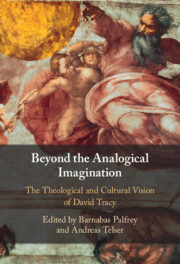Book contents
- Beyond the Analogical Imagination
- Reviews
- Beyond the Analogical Imagination
- Copyright page
- Epigraph
- Contents
- Contributors
- Acknowledgements
- Introduction
- Part I Theology and Culture
- Chapter 1 David Tracy’s Theology-in-Culture
- Chapter 2 Analogical Imagination and Ana-theological Believing
- Chapter 3 Closed Totality, Collage, and the Fragmentary Between
- Part II Public and Beyond
- Part III Church and World
- Part IV From David Tracy
- Part V Post-Script
- Bibliography
- Index
Chapter 2 - Analogical Imagination and Ana-theological Believing
from Part I - Theology and Culture
Published online by Cambridge University Press: 28 September 2023
- Beyond the Analogical Imagination
- Reviews
- Beyond the Analogical Imagination
- Copyright page
- Epigraph
- Contents
- Contributors
- Acknowledgements
- Introduction
- Part I Theology and Culture
- Chapter 1 David Tracy’s Theology-in-Culture
- Chapter 2 Analogical Imagination and Ana-theological Believing
- Chapter 3 Closed Totality, Collage, and the Fragmentary Between
- Part II Public and Beyond
- Part III Church and World
- Part IV From David Tracy
- Part V Post-Script
- Bibliography
- Index
Summary
This essay introduces and explores David Tracy’s notion of ‘analogical imagination’ as something that prevents reason, theology, and social life from collapsing ‘into equivocation or else hopeless stupid conflict’. A capacious reflective reason, after Tracy, depends on imaginative habits and sensibilities that stay faithful to the discordant plurality and ambiguity of things while also acknowledging their analogies or ‘similarities-in-difference’. The essay argues that the continuing integrity and scope of Tracyean analogical imagination depends upon understanding that the negations that belong to apparently contrasting ‘dialectical imaginations’ reach ‘all the way down’ within analogical imagination itself. Aided by classic expressions of culture, furthermore, analogical imaginative possibility shades into contingent vision when organised by ‘focal meanings’ to fashion some global sense of the world. This is then brought into dialogue with Richard Kearney’s comparatively recent notion of ‘anatheism’, to help consideration of how Tracyean analogical imagination might maintain its imagination and ana- at the perilous point that it becomes also a matter of religious believing.
Keywords
- Type
- Chapter
- Information
- Beyond the Analogical ImaginationThe Theological and Cultural Vision of David Tracy, pp. 41 - 64Publisher: Cambridge University PressPrint publication year: 2023

